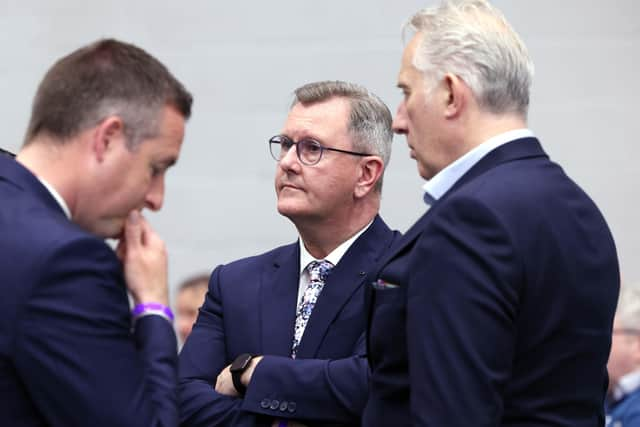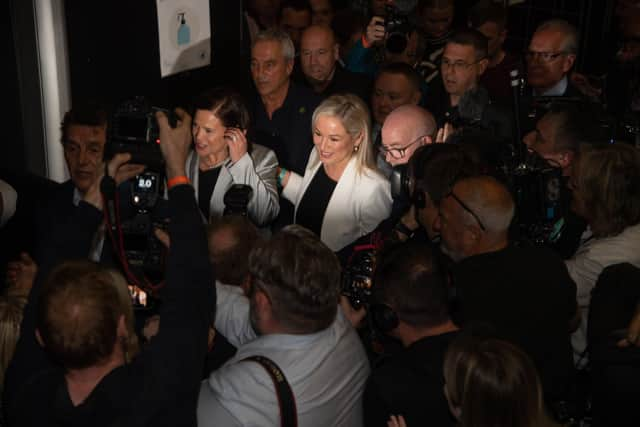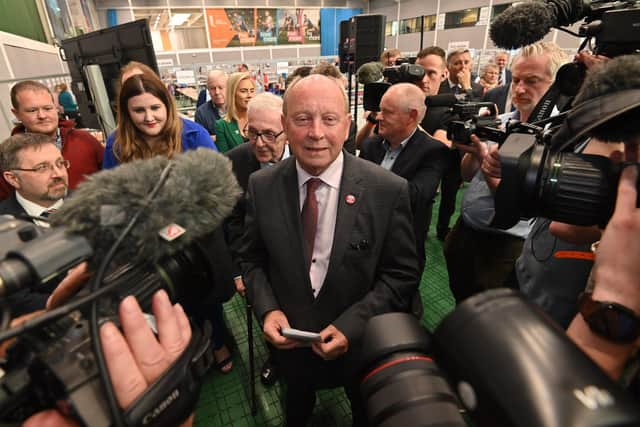Election 2022: Stormont stalemate as Sinn Fein biggest party but DUP leader Sir Jeffrey Donaldson sticks to guns on protocol
and live on Freeview channel 276
The DUP leader also made clear that his party will not be entering any new Executive next week while the Northern Ireland Protocol remains in place.
Sir Jeffrey told the News Letter he will use the debate in the House of Commons this Tuesday to inform Boris Johnson that there will be no DUP return to power-sharing until the government “decisively deals” with the post-Brexit trade deal all unionists say is decoupling Northern Ireland from the rest of the UK.
Advertisement
Hide AdAdvertisement
Hide AdIn what has been a bruising election for unionism in general the DUP estimates it will return with between 25 to 26 seats but will still finish second to Sinn Fein. Jim Allister’s TUV soared to 8% of the vote, but despite this might not have won a second seat.


Signalling that Stormont is heading for stalemate, Sir Jeffrey said: “I will be tell the prime minister that it is almost exactly 12 months from when his government released a command paper on the protocol which outlined many of the problems caused for the political institutions and the economy here in Northern Ireland.
“I will make it clear in the debate in the Commons that the protocol must be altered. That is fundamental to preserving Northern Ireland’s place within the Union and until it is replaced our position on the Executive remains the same.”
He issued a challenge to the leaders of other unionist parties to hold talks soon on future electoral co-operation and strategies which he described as “one of my top priorities” over the coming few weeks.
Advertisement
Hide AdAdvertisement
Hide AdSir Jeffrey warned that “a divided unionism does not deliver more seats” and that this “only gives victory to our opponents”.


Sinn Fein is on course for a historic victory in the Assembly election, after receiving the most first-preference votes.
With counting for the 90 Stormont seats continuing today, by 11.30 last night the republican party had won 17 seats, ahead of the DUP on 11, Alliance on seven, the Ulster Unionists on four and the SDLP on two.
Sinn Fein looks set to emerge with the most seats after it received 250,388 first preferences, compared with 184,002 for the DUP and 116,681 for the Alliance Party.
Advertisement
Hide AdAdvertisement
Hide AdThis means that it received 29% of first preference votes, compared with 21.3% for the DUP, 13.5% for Alliance, 11.2% for the Ulster Unionists and 9.1% for the SDLP.


Naomi Long’s Alliance Party looks set to be the other main winner from the election, with a surge of support for the cross-community party likely to make it the third largest at Stormont, ahead of the UUP and SDLP, who have both had disappointing results.
Sinn Fein’s vice president Michelle O’Neill was elected on the first count in Mid Ulster, with Alliance leader Naomi Long topping the poll in East Belfast.
DUP leader Sir Jeffrey Donaldson was elected on the first count in Lagan Valley.
Advertisement
Hide AdAdvertisement
Hide AdHe said he was delighted with his party’s performance in Lagan Valley, adding that it was too early to comment on the overall picture to say what the final outcome might be.
“I think it is going to be very tight at the end as to who will emerge as the largest party,” he said.
“One of the key messages for me is that unionism simply can’t afford the divisions that exist.”
Ms O’Neill was surrounded by party colleagues and supporters as the result was announced in the Magherafelt count centre.
Advertisement
Hide AdAdvertisement
Hide AdShe received 10,845 first preference votes and the result was greeted by large cheers in the count centre.
Speaking to reporters shortly before her election was announced, Ms O’Neill said she was “very grateful” to be with the people of Mid-Ulster.
Asked about the possibility of her taking the first minister role, she said: “It is very early to say, let’s get all the votes counted.
“I feel very positive.”
She said that Sinn Fein wanted to “together work in partnership with others”.
Advertisement
Hide AdAdvertisement
Hide Ad“That is the only way we will achieve much, much more for people here, whether in terms of the cost-of-living crisis or trying to fix our health service.”
Ms Long, speaking in Belfast, dedicated her victory to her father-in-law.
“It’s been a good day so far for Alliance and obviously it’s been a good day for me personally in East Belfast, and also for Peter McReynolds, and we expect that we will hold the two seats there.
“It’s been quite an emotional election campaign for me.
“I lost my father-in-law in the last few weeks, and we buried him yesterday.
Advertisement
Hide AdAdvertisement
Hide Ad“I just want to dedicate this win to him, because without family I could not do what I do, and without their support I would not be where I am.”
The first MLA elected to the Stormont Assembly declared an Alliance Party surge.
Kellie Armstrong was elected for the Strangford constituency on the first stage of the count with 7,015 votes.
Ms Armstrong said it was the start of a surge for the party in the Assembly elections.
Advertisement
Hide AdAdvertisement
Hide AdUlster Unionist Robin Swann, who was health minister during the Covid-19 pandemic, was elected after he topped the poll in his North Antrim constituency.
In North Down, independent candidate Alex Easton, who quit the DUP last year, topped the poll.
Some 239 candidates stood across 18 constituencies.
Striking council and education workers staged demonstrations outside a number of the count centres as part of their two-week strike over a rejected pay offer.
Outside the Titanic Exhibition Centre, Belfast City Council worker and Unite shop steward John Moore said they want politicians to take note that “this isn’t going to stop until people come to the table and talk to us”.
Advertisement
Hide AdAdvertisement
Hide Ad“We were offered a 1.75% pay rise after nearly 12 years of pay cuts and pay freezes, and that 1.75% is just another pay cut, people have to meet their household bills, pay for food and energy, and they just can’t do it,” he said.
Asked about the elections in Northern Ireland, Prime Minister Boris Johnson said “the most important thing is that we continue to support the balance of the Good Friday Agreement across all communities in Northern Ireland”.
STATE OF THE PARTIES:
SF 17;
DUP 11;
ALLIANCE 7;
UUP 4;
SDLP 2;
others 1
See also: